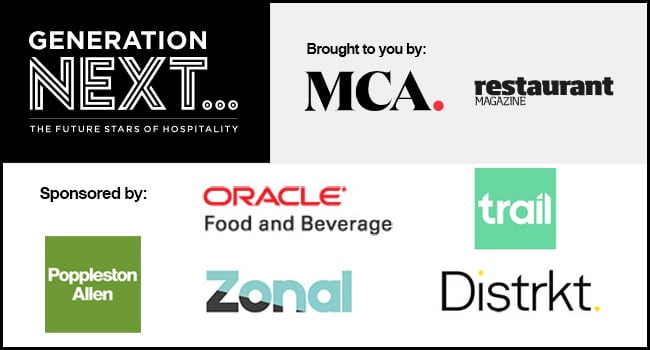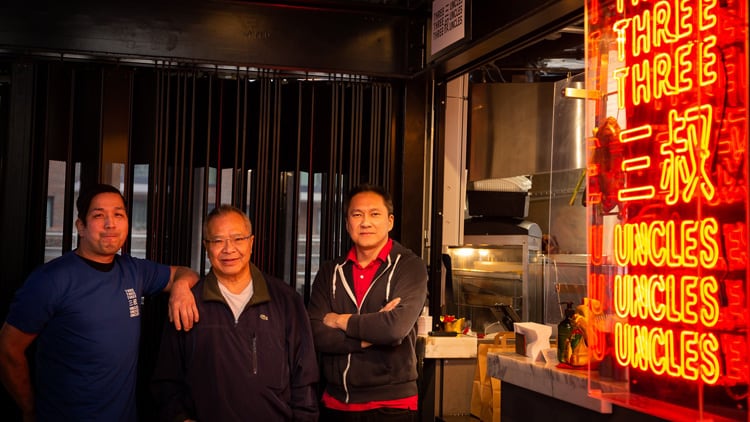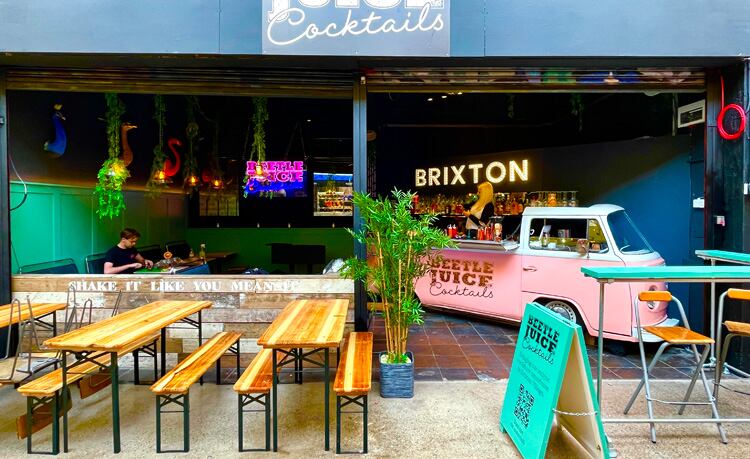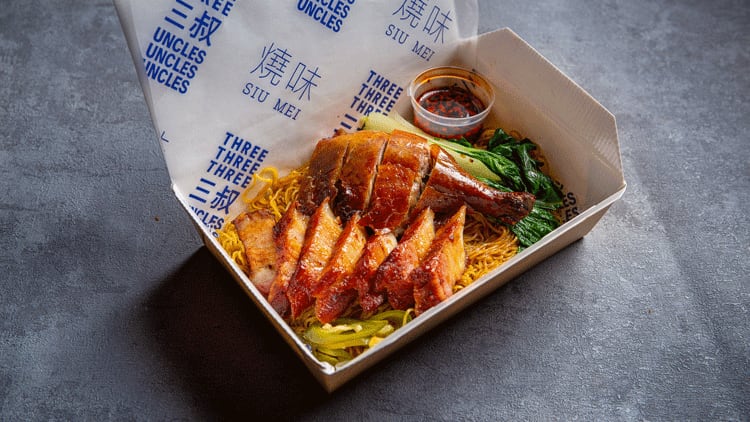“This is the opportunity for people to experience our restaurant as we always imagined it,” says Pui Sing Tsang, affectionately referred to as Uncle Sidney and one of the eponymous trio behind Three Uncles, with a beaming smile. Back in 2019, he and friends Cheong Yew and Mo Kwok - Uncle Lim and Uncle Mo – launched a small grab-and-go kiosk near Liverpool Street station that specialised in homemade, chopped-to-order Cantonese roast meats served with pak choi and steamed Jasmine rice, and almost immediately it caught the attention of London’s dining scene.
Fay Maschler, then of the Evening Standard, wrote joyfully of devouring char sui bao buns and ‘thrumming’ wontons in red chilli oil; while The Telegraph’s Keith Miller described the roast meats as ‘superb’, and also gave a shout out to the Hainan chicken, which he called ‘profoundly, soul-soothingly chickeny’.
Having managed to weather the Covid pandemic, a second quick-service location opened last September at Camden’s Hawley Wharf. But for the uncles, the focus was on trying to open something bigger. “We were always meant to be a restaurant, but due to the pandemic we had to change our plan,” says Sidney.
“This is the opportunity for people to experience our restaurant as we always imagined it”
Which brings us to Brixton, specifically Brixton Village, where Three Uncles has just launched its first permanent, sit-down restaurant. For those already acquainted with the brand, much is familiar, from the trademark blue and white colour scheme to the red neon signage. And the menu, though bigger than that in the City and Camden, remains tightly focused on siu mei roast meats that can be seen hanging in the window, and a small selection of freshly steamed dim sum. Similar to the other sites, prices are pitched at between £9 and £12 for main dishes, with sides hovering around the £5 mark.
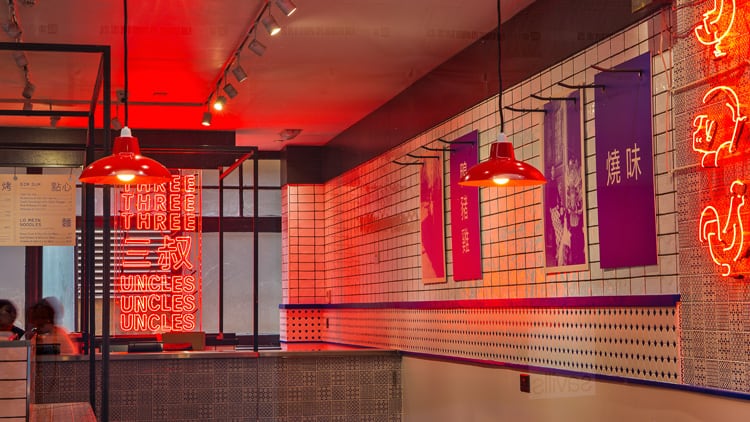
To call it a sit-down restaurant is, perhaps, somewhat generous. The 600sq ft unit doesn’t feel much bigger than the kiosk site in Liverpool Street, which also has a smattering of indoor seating available. Indeed, the dining area in Brixton appears smaller than the kitchen, with more chairs available outside in the market arcade than inside the restaurant itself.
For the uncles, though, it’s perfect. “What we’ve been surprised with here is the popularity of the eat-in offer,” says Sidney. “We weren’t sure that would be the case and assumed it would be about a 50/50 split between people eating in and ordering takeaway. But customers do see it as a sit-down place, which is crucial to us.”
To drive as much footfall as possible to the restaurant, the uncles have even opted – for now, at least – to eschew offering delivery from the new restaurant: “Our plan is to concentrate on the eat in experience. We don’t want to ruin it by having a load of delivery drivers constantly coming in and out of the restaurant.”
Coming to London
Sidney, Lim and Mo all grew up in Hong Kong and have known each other since school. All three pursued a career in hospitality, both in China and in London where they eventually relocated to - Sidney running his own Chinese restaurants and Lim and Mo both working as chefs. Mo, notably, went on to train as a roast meat master, as his father had done before him.
The idea for Three Uncles was born out of the treasured memories the three have of visiting the roast meat cafes near Wan Chai market in Hong Kong while growing up. “We take the inspiration from the fundamentals of the traditional restaurants we used to go to,” explains Sidney. “It’s about offering authentic, high-quality food, but also value for money. That is why these cafes have stood the test of time and are such a huge part of Hong Kong society.
“We have taken these fundamentals and brought them into a contemporary and modern environment.”
“What we are doing is taking Chinese culture to a new audience”
Crucial to the uncles’ strategy was not basing the business in London’s Chinatown, where the sight of sui mei hanging in the windows is commonplace, but instead choosing to target different neighbourhoods. “We love Chinatown. We spend much of our time there, have many friends there and are proud to live in a city that celebrates and embraces Chinese culture.
“What we are doing is taking Chinese culture to a new audience, and into communities that don’t necessarily come into Chinatown, or sometimes have never been there. In Hong Kong, sui mei cafés are part of communities and that is our intention – not to be a high street chain, but a café within a community that sells good food at a good price.”
A one-dish focus
It’s certainly fair to say Three Uncles has managed to carve out a successful niche for itself in London. City newspaper City Matters recently praised the brand for bringing ‘takeaway-friendly Chinese food out of Chinatown and into the Square Mile’; and in December, food magazine Olive recognised it as one of the best Chinese restaurants in the capital.
On an average week, the three sites can get through 600 to 800 ducks between them – a daunting figure given the arduous preparation. All roast recipes follow the classic Cantonese technique of marinating the meat on the inside; rubbing on the outside; before hanging and fan drying it. In total, the process takes three days.
All of the prep is overseen in a central kitchen, with the meat then transported to the restaurants and roasted on site using specialist ovens the uncles had shipped from Hong Kong. It is then rested, before being chopped to order.
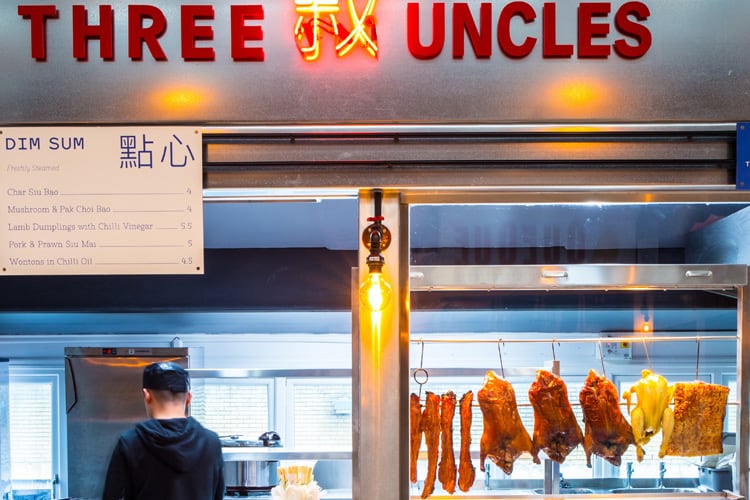
While Londoners may be more accustomed to seeing sui mei served as part of a much wider Chinese menu, the decision to focus on just one dish is central to the uncles’ concept; although given the labour involved, they admit it makes the economics more challenging. “We are focusing on one dish because this is fundamental of the sui mei cafes in Hong Kong, and we share the belief that if you focus heavily on every detail of one type of dish it is going to be perfect,” says Sidney.
“There is some financial advantage to buying [the meats] in larger quantities, of course. However, the preparation process is so time intensive that this really does not provide any significant advantage to our business model. A portion of roast meat with rice and greens costs the customer around £10, and has taken three days to prepare.”
Key to making the economics work has been the uncles’ fastidious approach to expansion, and their shrewd ability to find units with a reasonable rent in or close to high-footfall locations. Combined, of course, with the brand’s ever-growing reputation. “We want to be recognised for our quality, and concentrating solely on the sui mei has allowed us to hone our skillset.
“In Brixton we are seeing people walk in and look at our menu and ask us to explain what our dishes are. We are proud to be accessible even for a dish that people have not tried before, this is really incredible.”
Keeping it simple
Brixton has given the uncles the space to broaden their menu slightly, with a sharing platter of roast meats featuring exclusively on the menu there, alongside a selection of lo mein noodle dishes, and a plate of minced pork with preserved veg. Also new is a roast duck and char siu noodle soup, made with a broth from the duck carcasses.
Sidney is keen to stress that this doesn’t reflect plans to expand the offering across the estate. “The bigger the menu, the more complicated,” he says. “You will never be good at everything, no way. So, we might as well concentrate on what we know. And if that means it’s a simple menu that’s fine.”
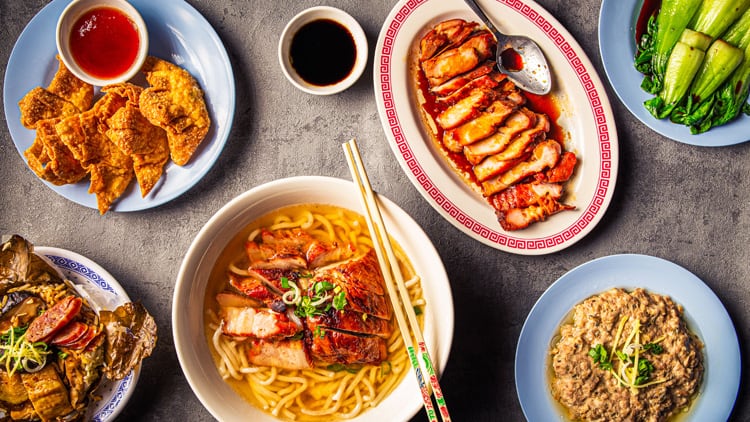
Thoughts of further expansion are far from the uncles’ minds, but it is certainly something they want to explore in time. “We have been really surprised with the response and we would really like to see Three Uncles in more communities in London.”
Larger sites could be on the cards, although Sidney says they’d never like to go beyond around 40 covers in terms of space. And while the idea of expanding beyond the capital is appealing, it would mean opening another central kitchen, which at the moment is not an option.
“We’re still a young business and that’s helped us adapt to the changing market throughout the pandemic. This is a café, which moves us away from the QSR model, and if we think it works then we’d like to explore that further. Grab and go is easier to handle, but this is more satisfying.”
